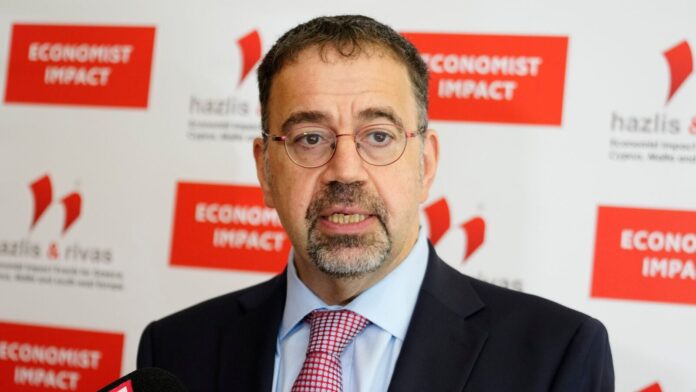In a podcast interview I hosted with Acemoglu (full episode available at https://shorturl.at/R8s0u), I asked Acemoglu to apply his ‘institutions’ framework and current thinking to technology in the Indian context.
During our discussion, Acemoglu suggested a multi-faceted approach for India to become a leader in tech development. For this, he said, the country should focus on: (a) moving beyond being a talent nation to driving greater product innovation, (b) strategically navigating the global tech landscape through alliances, and (c) advocating a pro-human direction for technology domestically.
Moving Beyond a ‘Talent Nation’: Acemoglu acknowledged India’s potential in technology, especially given its large, well-educated and tech-savvy population. These factors also mean that India holds significant potential in fields related to emerging technologies such as artificial intelligence (AI).
However, he warned against remaining solely a “talent nation” providing offshoring services, as India faces “tremendous danger” if it remains reliant on jobs that are vulnerable to automation by AI. Therefore, India must deliver on its promise to become a creator of technology.
India must aim, he argued, to establish product companies with robust business models and the capacity to develop global leadership in high-value-added sectors. This entails investing in research and development (R&D), nurturing a vibrant startup ecosystem, and creating an environment conducive to innovation.
Acemoglu acknowledged that this transition will take time, much like China’s journey from producing low-cost goods to becoming a technological powerhouse.
Strategic engagement in the ‘Great Tech Game’ through a national tech strategy and alliances: Even as India moves up the value-added ladder, Acemoglu cautions against viewing the current global technological landscape solely within the context of the US-China rivalry.
He pointed out that this ‘Great Tech Game’ has implications for all nations, and countries like India should not remain passive bystanders. Instead, India should develop a ‘National Tech Strategy’. India will need to formulate a comprehensive economic and geopolitical strategy that defines its role and aspirations within the global tech landscape.
This strategy should identify key areas of focus, leverage India’s strengths in talent, scale and innovation, and address key challenges posed by automation and the dominance of existing tech giants.
India must also forge strategic tech alliances, and collaborate with other emerging economies facing similar challenges, such as Turkey, Indonesia, Mexico, and Brazil.
By forming alliances, these nations can collectively push their interests on the world stage, shape global regulations concerning technology, and counter the undue influence of the US and China in shaping the future of technological development.
In particular, he stressed that India, along with other emerging powers, must actively participate in shaping the global AI landscape.
As a rising tech power, India should actively participate in global discussions and initiatives aimed at promoting responsible AI development and deployment.
This involves advocating ethical guidelines, transparency in algorithms, and measures to prevent the misuse of AI for surveillance, manipulation or anything that exacerbates inequality.
Champion a pro-human approach to technology: As Acemoglu argues in his most recent book, Power and Progress, while technological advancement is critical for prosperity, Indian policymakers must remember that it does not automatically lead to societal progress.
Institutions and policy choices, he argued, are important in ensuring that technological innovations are used for the larger good and that wealth and power does not get concentrated in the hands of a few.
Accordingly, he warned against getting swept in the wave of excessive techno-optimism, as is prevalent in the US, and emphasizes the need for a more balanced approach that considers potential risks and societal consequences.
Like many others, Acemoglu sees the rise of Generative AI as a pivotal moment in history. Yet, active decision-making and the establishment of new institutions will need to be established to ensure that this new technology wave benefits society broadly and not just a few.
For example, he highlighted the need to empower labour unions and civil society organizations, and said a free and independent media is crucial to counterbalance the influence of tech corporations and argue for a more equitable distribution of the benefits of technological progress.
Given the importance of directing technology towards human betterment, India should promote a human-centred tech policy. Policymakers should prioritize the development and adoption of technologies that empower workers, enhance skills, and create new opportunities rather than simply replacing human labour. This includes investing in areas like education, healthcare and social services that leverage technology to improve human well-being.
Unlike many others in the US who argue for a purely market oriented approach to tech and innovation, Acemoglu emphasized the crucial role of the state in shaping the path of India’s technological development, and especially on two specific dimensions.
One, he stressed the need for India’s state institutions to regulate powerful entities, such as large corporations and influential individuals, to prevent them from exploiting their positions and undermining fair competition.
India’s emphasis on digital public infrastructure and building a data commons, as a way to provide a level playing field for entrepreneurs and innovators, are steps in the right direction.
Two, he recommended state policies that promote the use of technology for human betterment, rather than solely for automation, given India’s large labour force.
This includes supporting R&D in areas that enhance the productivity of India’s massive labour force, instead of automation-oriented technologies that could have detrimental consequences for structural employment.
These recommendations by Acemoglu serve as excellent starting points for a broader conversation in India on ensuring that we acquire competitive leadership within the global technology ecosystem, while redirecting technology towards a more equitable and human-centric future. That could truly be ‘The India Way.’
Anirudh Suri is a non-resident scholar at Carnegie India and host of The Great Tech Game Podcast.
#Daron #Acemoglus #threepoint #roadmap #Indias #tech #leadership
